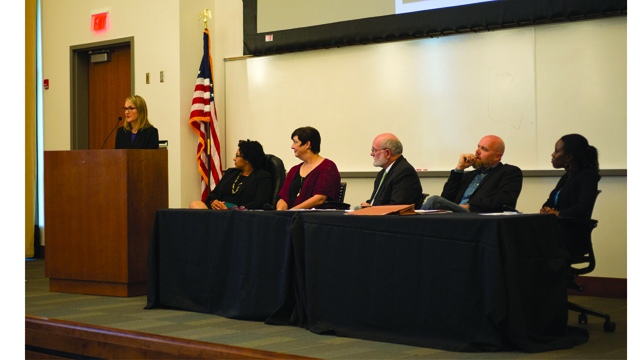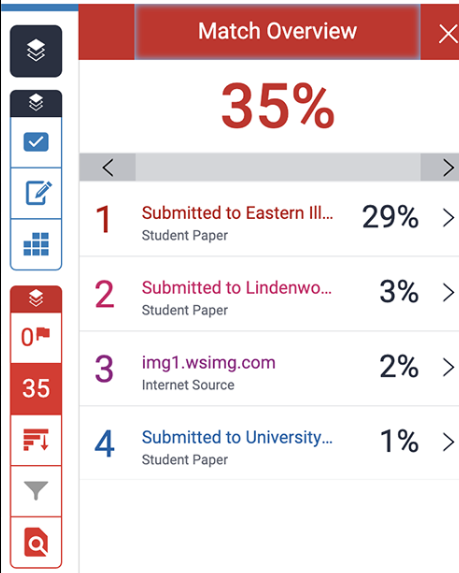On April 26, a group of experts on criminal justice met together in a panel to discuss mass incarceration in Mississippi at 6 p.m. in Scianna Hall.
The panel was presented by the Department of Interdisciplinary Studies’ Southern Studies program and co-hosted by the Honors College, Department of Political Science, School of Social Work and the School of Criminal Justice.
Tuesday night’s panel consisted of senior supervising advocate at the Southern Poverty Law Center Alisha Judkins, McDuff & Byrd attorney Jacob Howard, criminal justice professor Wes Johnson and associate professor of social work Tamara Hurst.
Rebecca Tuuri, assistant professor of history and coordinator of a new Southern Studies concentration in Interdisciplinary Studies program, introduced the topic to the audience.
“This nation is now the definitive leader in the world in incarceration,” Tuuri said.
According to Tuuri, the rate of incarceration in the U.S. in the past 30 years has grown over 430 percent.
Mississippi has one of the highest rates of incarceration – not only of adults but also children.
According to World Atlas, a travel website that compiled a list of states with the highest incarceration rates, Mississippi is ranked third.
Alissa Johnson, moderator of the panel and an attorney in Jackson, added to the discussion of statistics. Alissa Johnson added that between the decade of 2003 to 2013, Mississippi’s prison population increased by 17 percent and by July of 2013 had 23,000 prisoners in custody.
She said two-thirds of those prisoners were sentenced for nonviolent offenses by violating the terms of their probation.
“When we talk about mass incarceration and the wonderful work the panel is doing, we have to look at it as we are at a point of crisis,” Johnson said.
After a brief introduction of statistics, the discussion began with the panelists on the effect mass incarceration has on the community.
Jacob Howard has litigated civil rights and criminal cases in post-conviction stages of state and federal court.
At Tuesday night’s panel, he said there was a growing number of evidence that more incarceration makes the community less safe.
“Sending low-risk, nonviolent offenders to prison increases the chance that they will commit crimes when they’re released from prison,” Howard said.“Sending low-risk, nonviolent offenders to prison increases the chance that they will commit crimes when they’re released from prison,” Howard said.
Alisha Judkins has worked with clients in the reentry process. During the panel discussion, Judkins said that prisons do not equip prisoners with the skills necessary to keep them out of prison again.
“If prisoners don’t have family or community support, then it becomes a revolving door,” Judkins said.
Wes Johnson has written over 50 scholarly articles and made numerous presentations dealing in criminal justice. Johnson discussed how important treatment is to resolving the increasing incarceration problem.
Johnson believed the focus on funding jails and prisons, while very important, is short-sighted.
“If you want to go upstream, you got to look at how to go about restoring communities and treatment of inmates is an important part of that,” Johnson said.
Tamara Hurst is also the current director of Mississippi’s Wraparound Initiative.
According to the National Wraparound Initiative website, is dedicated to helping children connect with caring adults in order to live and thrive in positive communities.
During the panel, Hurst was worried about prison’s level of treatment towards inmates, both minors and adults. “I know that jails and prisons do not invest in the best medications or therapies that are out there,” Hurst said.
Mental health of inmates was an important discussion amongst the panel. Judkins mentioned the problems she experienced while working at East Mississippi Correctional Facility. The facility, which is the only one in the state which allows the housing of mentally ill inmates, never had a full time psychiatrist until last fall, according to Judkins.
“I have been working in Mississippi for over five years and this is the first time I have ever been in a psychiatric facility without seeing a psychiatrist on a regular basis,” Judkins said.
The panel discussed solutions to the problem of mass incarceration in the state. In terms of solutions and changing the system, Howard said that the best way to enact change is at the ballot box.
“I think if you’re genuinely interested in changing the system, the way to do it is to vote,” Howard said.
The problem of mass incarceration brought people from all sorts of backgrounds together for an open panel discussion on a solution.
“Working in criminal justice is a collaborative system,” Hurst said. “No one group can do it by themselves.”




























